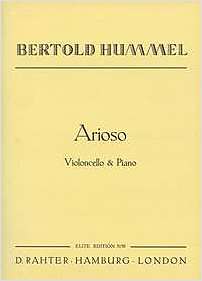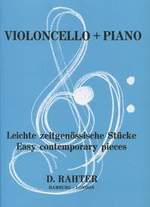
Duration: 4 Minutes
Publisher:
N. Simrock Hamburg - London (Boosey & Hawkes) EE 5159 / ISMN M-2211-1570-6
Arioso is also published in: Easy contemporary Pieces; N. Simrock Hamburg - London (Boosey & Hawkes) EE 3300 / ISMN: M-2211-1287-3

Press
STRINGS/USA Feb.1991
It is no surprise to discover that composer Bertold Hummel trained as a cellist
as well as a composer. He writes with an intimate knowledge of strings, and seems
to favor the lower sound of viola and cello. His special talent is for composing
pieces which are full of variety and vitality, but technically easy enough for
capable students. These pieces will delight teachers and students who are looking
for accessible contemporary music.
Hummel is at his best in pieces such as
the Sonatina No. 1, op. 35, originally written in 1969 for violin
and piano, and also available in arrangements for viola and piano, and cello and
piano. The strong rhythms and hold harmonies of the first movement contrast with
the second movement, an elegy played con sordino. The lively last movement alternates
an alla breve time signature with 3/4 time. The piano part supplies a good deal
of musical interest, and the piece is always musically gratifying.
The
Sonatina No. 2 for cello and piano is another piece in Hummel's varied,
economical style. Like the Sonatina No. 1, this piece is made up
of three contrasting movements, with a slow middle movement. The entire cello
part can be played in the first position. However, the piano part, although well-balanced
with the cello part, is far from easy, and the effect is somewhat reminiscent
of the Three Easy Pieces by Hindemith. The Little Suite,
for cello and piano, and the short but effective Arioso for
cello and piano, from 1986, round out Hummel's significant contribution to the
literature for cello and piano.
Although many of Hummel's pieces for solo
stringed instrument and piano are clearly intended for students, I would not hesitate
to place them on a recital program. Their beauty and excitement could not fail
to please an audience.
(D.M. B.)